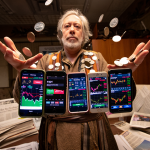
Mass Delusion Psychosis: The Mind Virus That’s Stealing Your Money Right Now
Jun 9, 2025
“Mass delusion psychosis” isn’t a formal clinical term used to describe market phenomena, but it effectively captures the essence of speculative bubbles and manias in investing. It refers to situations where a large number of investors, often driven by a combination of psychological biases and external factors, engage in irrational behaviour, leading to asset prices detaching significantly from their fundamental value.
But let’s strip away the academic politeness: Mass delusion psychosis is a contagious mental disease that turns rational humans into mindless zombies chasing digital tulips. It’s the psychological plague that’s infected every market bubble since humans first discovered greed, and it’s probably infecting your portfolio right now.
Think you’re immune? That’s exactly what every bankrupt investor thought before the music stopped. The scariest part about mass delusion isn’t that it happens—it’s that the infected don’t know they’re sick until it’s terminal.
The Anatomy of Financial Insanity: When Everyone Loses Their Damn Minds
Mass delusion psychosis doesn’t announce itself with sirens. It creeps in like carbon monoxide—odourless, invisible, lethal. One day, you’re a rational investor; the next, you’re mortgaging your house to buy JPEGs of monkeys because “blockchain is the future.”
Here’s how the infection spreads: First comes the story. Not just any story—a narrative so compelling it rewrites reality. “The internet changes everything.” “Real estate never goes down.” “This time is different.” The story becomes a virus, spreading from mind to mind, mutating rationality into religious fervour.
Then comes the most dangerous phase: social proof on steroids. When your neighbour’s making money, your brother-in-law’s getting rich, and every idiot on social media is flashing gains, your primitive brain overrides your prefrontal cortex. You’re not investing anymore—you’re joining a cult.
The tragedy? The smarter you are, the better you become at rationalising your delusion. You’ll find sophisticated reasons why paying 500x earnings makes sense. You’ll cite revolutionary paradigms. You’ll sound brilliant while marching off the cliff with everyone else.
FOMO: The Gateway Drug to Financial Suicide
Fear of Missing Out isn’t just social media anxiety—it’s the psychological crack cocaine of investing. It hijacks your neural pathways, flooding your system with cortisol and adrenaline until rational thought becomes impossible.
Watch how FOMO transforms investors into addicts: They see others getting rich (or claiming to). Their amygdala fires up, triggering primal fear—not of loss, but of being left behind. The pain of watching others succeed while you sit on the sidelines becomes unbearable.
So you jump in. Just a little at first. But the market rewards your irrationality with gains, and now you’re hooked. You need bigger hits, larger positions, more leverage. You’re not investing—you’re chasing a high that requires exponentially more risk to achieve.
The dealers? Financial media are pumping success stories 24/7. Social media influencers are showing off Lamborghinis bought with paper gains. Your own brain, desperate to belong to the winning tribe. They all work together to ensure you’ll buy high and sell low.
The Media: Your Friendly Neighbourhood Psychosis Dealer
Let’s talk about the media’s role in mass delusion—they’re not observers; they’re accomplices. Every bubble needs its pushers, and modern media has perfected the art of psychological manipulation.
Financial media doesn’t sell information—it sells emotion. During bubbles, they pump hope like a cartel flooding the streets with product. “Dow hits new high!” “This stock soared 1000%!” “You could be next!” Each headline is carefully crafted to trigger FOMO and suppress critical thinking.
But here’s the sick genius: They’re not lying. They’re just selectively telling truths that feed the delusion. They’ll interview the lottery winner, not the million losers. They’ll showcase the startup unicorn, not the thousand failures. It’s reality TV masquerading as financial journalism.
Social media? That’s where mass delusion goes nuclear. Echo chambers on steroids. Algorithms are designed to show you what confirms your biases. Influencers who profit from your losses. It’s a 24/7 propaganda machine that makes Orwell look optimistic.
Historical Body Count: The Graveyard of Mass Delusions
Tulip Mania? Picture the Dutch in the 1630s trading their houses for flower bulbs. Not metaphorically—literally signing over deeds for plants. When the psychosis broke, an entire nation discovered they’d bet their wealth on gardening supplies.
The South Sea Bubble? Smart money, including Isaac Newton, lost fortunes chasing phantom profits from a company that essentially did nothing. Newton later said, “I can calculate the motions of heavenly bodies, but not the madness of people.”
The 1929 crash? Shoe-shine boys giving stock tips should have been the warning. Instead, it became validation. Everyone was a genius until margin calls turned millionaires into paupers overnight.
Dot-com bubble? Companies with no revenue, no business model, no hope of profit—valued at billions because they had a website. Pets.com spent $11 million on a Super Bowl ad while burning through investor cash. The sock puppet became the mascot of mass stupidity.
2008 housing crisis? “Real estate never goes down” became religious doctrine. Strippers owned five houses. Mortgage brokers gave loans to dead people. The entire financial system played hot potato with toxic debt until the music stopped.
Recent meme stock mania? Teenagers became millionaires trading phone apps while professionals got steamrolled. GameStop, a dying retailer, was briefly worth more than Delta Airlines. Mass delusion weaponised by Reddit and aimed at Wall Street.
The Psychology of the Greater Fool: Russian Roulette in a Tuxedo
The Greater Fool Theory is mass delusion’s final form. Everyone knows the asset is worthless, but they buy anyway, believing someone dumber will pay more. It’s musical chairs with money, and everyone thinks they’ll find a seat when the music stops.
This isn’t investing—it’s a Ponzi scheme with extra steps. The early players profit from later suckers, creating the illusion of genius. But here’s the brutal math: For every winner, there must be losers. The pyramid requires fresh victims, and eventually, you run out of fools.
Psychology is fascinating and terrifying. Participants know it’s a scam but believe they’re smart enough to time the exit. It’s like knowing the casino has rigged odds but thinking you can beat them anyway. The house doesn’t just win—it owns your mortgage.
The Cure: Psychological Warfare Against Your Own Brain
Want to escape mass delusion psychosis? First, accept that you’re not immune. Your brain is running ancient software in a modern world, and that software has viruses. Confidence in your immunity is the first symptom of infection.
Second, invert everything. When everyone’s buying, ask why you should sell. When financial media is pumping a story, look for what they’re not saying. When your emotions scream “act now,” that’s exactly when you should do nothing.
Third, study the graveyard. Every bubble leaves bodies—examine them. Not the winners who got lucky, but the smart people who got slaughtered. Learn their mistakes, because those mistakes are probably your instincts.
Fourth, build systems that protect you from yourself. Rules-based investing isn’t sexy, but neither is bankruptcy. If your strategy requires you to be smarter than everyone else, you don’t have a strategy—you have a gambling problem.
The Brutal Truth: You’re Probably Already Infected
Reading this and thinking “great article, but it doesn’t apply to me”? Congratulations, you’re exhibiting symptoms. The most dangerous aspect of mass delusion psychosis is that victims think they’re immune.
Look at your portfolio. How many positions are based on stories rather than numbers? How many purchases were driven by FOMO? How often do you check prices, seeking dopamine hits from green numbers?
The market is a psychiatric ward where the patients think they’re doctors. Everyone’s diagnosing everyone else’s delusions while blind to their own. The only difference between you and the tulip maniacs is the asset class and the century.
But here’s the opportunity: While the masses chase phantoms, disciplined investors feast on the wreckage. Every bubble creates two things—victims and vultures. Your choice which one you become.
Weaponize the Madness or Become Its Victim
Ready to turn mass delusion psychosis from your enemy into your edge? We’ve compiled 20 years of bubble psychology into one brutal guide: “The Mass Delusion Antidote: 7 Psychological Shields Against Market Madness.”
This isn’t feel-good fluff about “staying rational.” It’s a tactical manual for profiting from others’ insanity while protecting your own capital and sanity. Learn the exact triggers that signal peak delusion, the contrarian strategies that turn crashes into wealth, and the mental models that separate predators from prey.
Join our Tactical Investor newsletter for weekly doses of psychological warfare against market manipulation, mass delusions, and your own worst instincts.
[Get your free guide and newsletter access here]
The next bubble is inflating right now. You’re either riding it consciously or being ridden by it unconsciously. Choose wisely.










